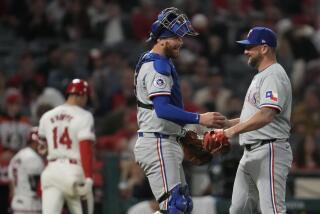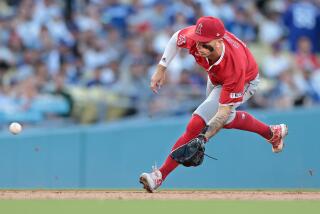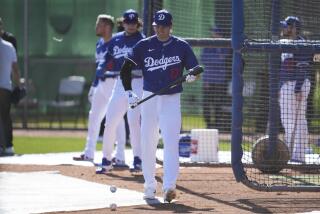Fabregas Too Hot to Be Cool for Angels
- Share via
Rookie catcher Jorge Fabregas slammed his fist into his mitt.
It was 15 minutes before the Angels were to leave their clubhouse for batting practice and Fabregas was already keyed up. Three hours before game time and he watched the clubhouse goings-on intently. One week in the major leagues and he still wanted to soak up every possible moment.
Across the room, Bo Jackson opened fan mail, wondering how he would ever have time to read it all. Nearby, Brian Anderson and Spike Owen spoke with reporters. Jim Edmonds walked to the trainer’s room. Chili Davis chatted with teammates.
But Fabregas sat in front of his locker, watching and punching his mitt.
After a week, it was still difficult for him to believe he was here.
There’s no question he’s made an immediate impact, though. Fabregas’ debut has been the only positive development for the Angels since catcher Greg Myers was put on the disabled list because of a sprained knee suffered in a home-plate collision with Boston’s Mike Greenwell on April 23.
The Angels start tonight’s game against the New York Yankees as losers of nine of their last 10 games. Their pitching rotation is a shambles, no thanks to injuries and poor performances, and their hitting isn’t much to brag about either. They have scored nine runs in five games on this home stand.
Fabregas, 24, has been a tremendous surprise, going seven for 15 in six games last week. The Angels knew he was good and hoped he was ready to step up to the majors after two seasons of head-turning play in the minors.
“We’ve always liked him,” General Manager Bill Bavasi said. “We picked him high and rated him high.”
Bavasi, in his first season as general manager after nine years as the club’s director of minor league operations, isn’t troubled by Fabregas’ inexperience behind the plate. Neither is Manager Buck Rodgers, an Angel catcher from 1961-69.
“Sometimes behind-the-plate experience is overrated,” Bavasi said. “I’m not sure calling a game is akin to splitting the atom.”
Said Rodgers, “You can take a young catcher who’s been properly taught and bring him to the majors, and he’ll have an edge on somebody who’s been up a long time (but hasn’t had the same training).”
The Angels’ options were limited in this case. Without Myers, they were down to rookie Chris Turner, batting .103, and Fabregas, who was at triple-A Vancouver. Even their bullpen catcher is out, sidelined because of a broken arm suffered the same day Myers was injured.
It seems the Angels have been looking for a catcher ever since Bob Boone became a free agent after the 1988 season. Lance Parrish had a couple of solid years after Boone’s departure, but Ron Tingley and John Orton couldn’t do the job. And now Myers is injured.
Fabregas simply chooses not to ponder how or why he’s in the majors. He got his break and he’s determined to make the most of it.
“I feel sorry for what happened to Myers,” Fabregas said. “He took care of me during spring training. You never know when you’re going to get your break.”
Fabregas rocketed through the Angel farm system simply because he is a catcher. He was a third baseman in college, but when somebody handed him a catcher’s mask, shin guards and a chest protector, he saw it as his ticket to the majors.
“I pretty much knew the team that drafted me was going to make me a catcher,” he said. “I didn’t think I was a big league third baseman.”
At the University of Miami, Fabregas had a .331 batting average, seventh-best in Hurricane history.
The Angels drafted him in the first round of the 1991 draft, turned him into a catcher and sent him on his way.
In his first pro season, he batted .283 in 70 games at Class-A Palm Springs in 1992. Last year, he hit .289 in 113 games at double-A Midland and .231 in four late-season games at Vancouver.
Now, he’s in the big leagues, showing he might stick around.
“Early in my career I was a better hitter than a catcher,” Fabregas said. “Now, it’s evening up. I have bad at-bats, but I’ve learned you can’t take it behind the plate with you. You have to stay focused on every pitch.”
It’s far different from playing third base, where you can kick the infield dirt, spit and think about your last at-bat, your next at-bat.
“Catching is so important defensively that you can afford to give up a little offensively,” he said. “But nowadays, you can’t just hit .210. You have to put up some numbers. I try to do things to move guys over and drive in runs. I want to be a tough out every time I’m up.”
When Fabregas needs help behind the plate, he turns to Rodgers.
“Between innings, he’ll tell you to use the pitcher’s fastball more often,” Fabregas said. “He helps me out because I don’t know all the hitters.”
Rodgers has no qualms about letting Fabregas call the pitches, even with veterans such as Chuck Finley or John Dopson on the mound.
“I don’t want him to be afraid to try things,” Rodgers said. “The school of hard knocks is still the best university in the land. Jorge had good coaching at Miami and in the farm system. I’ve seen him come along. He’s learned the job good so far.”
Fabregas knows that a young catcher needs to inspire confidence among his teammates. It seems he’s already done that with Bavasi and Rodgers. The pitching staff is next.
“I want to put them in the frame of mind (to say), ‘I have no doubts when Fabregas is back there,’ ” Fabregas said. “I caught in the big league spring training camp for two years. I know what they like to throw. It’s not like I’m coming up here cold turkey.”
So far, Fabregas has left nothing to chance, looking poised and confident. He believed this was the season he would be called up. He just didn’t think it would happen so quickly. Or that he would be quite so successful.
More to Read
Go beyond the scoreboard
Get the latest on L.A.'s teams in the daily Sports Report newsletter.
You may occasionally receive promotional content from the Los Angeles Times.






